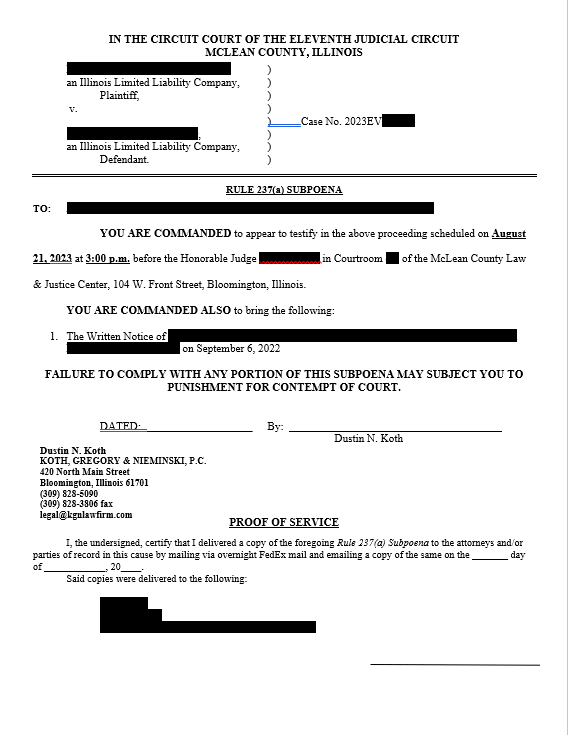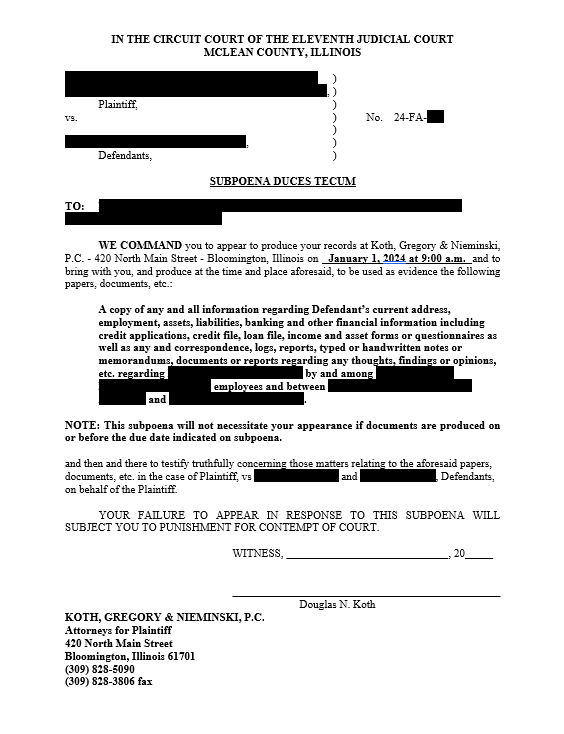Divorce proceedings often involve complex legal maneuvers, and one such tool at the disposal of attorneys is the subpoena. A subpoena is a powerful legal instrument used to compel individuals to provide testimony or produce evidence relevant to a divorce case. Understanding who can be subpoenaed in a divorce case in Illinois and the implications it holds is crucial for navigating the complexities of divorce litigation.

WHO CAN BE SUBPOENAED IN A DIVORCE CASE IN ILLINOIS
When it comes to divorce cases, the reach of a subpoena can extend to various individuals who possess valuable information or evidence relevant to the case. Here are a few key figures who can be subpoenaed:
- Spouses and former spouses
- Witnesses
- Experts and professionals
- Third parties
Subpoenas can play a vital role in divorce cases, enabling parties to gather relevant evidence, secure testimony, and build a strong legal argument. By understanding who can be subpoenaed and considering the implications, individuals can strategically utilize this powerful tool to support their case. You can download forms online but make sure you find a form in your county. These forms can typically be found on your county clerk’s office’s website.
Subpoenas for witnesses are governed by Illinois Supreme Court Rule 237(a). You can also subpoena documents and other tangible evidence with a “subpoena duces tecum” as seen below.
It may be even more important to subpoena witnesses when its a divorce from common law marriage. The reason is that one of the requirements some states have for a relationship to be legally classified as a common law marriage is that the couple must live together for some amount of time (some jurisdictions say 7 years but this is not standard across the board). Subpoenaing witnesses to either establish or dispute how long a couple has lived together could be critical. However, Illinois does not allow couples to get married by common law so this only applies to couples that had a common law marriage from one of the 9 states that allow it.
SPOUSES AND FORMER SPOUSES
The parties involved in the divorce case are often prime candidates for being subpoenaed. This includes both the petitioner (the spouse initiating the divorce) and the respondent (the spouse responding to the petition). Each party may be called upon to provide testimony or produce documents that shed light on the issues at hand, such as asset disclosure, financial information, or child custody matters.
WITNESSES
Witnesses play a significant role in divorce proceedings. These can include friends, family members, colleagues, or other individuals who possess firsthand knowledge or relevant information about the marriage, financial matters, child custody arrangements, or other pertinent aspects. Attorneys may subpoena witnesses to testify, supplying their unique perspective and contributing to the overall understanding of the case. Witnesses can offer evidence and show perspective to the jury from someone that isn’t as invovled as either party.
You may be wondering “Can I Use a Voice Recording as Evidence in Family Court in Illinois?” While there are many different forms evidence can take, different states have different rules regarding what evidence is admissable. Generally it is better to have a witness tell the jury their evidence themselves, but you should check out our soon to be published article above to learn more about using voice recordings as evidence.
EXPERTS AND PROFESSIONALS
In certain divorce cases, experts or professionals with specialized knowledge may be subpoenaed to supply their expert opinions or insights. These can include forensic accountants, property appraisers, child psychologists, or other professionals whose ability can help assess financial matters, property valuations, or child-related issues.
Some clients are concerned about whether their prior attorney can be subpoenaed and ask us, “Does It Look Bad If Your Lawyer Withdraws From Your Divorce Case In Illinois?“ Fortunately, attorneys must abide by the ethical rule of keeping communications with clients confidential, known as “attorney-client priviledge.” Also, attorneys typically cannot be subpoenaed to testify for or against clients or former clients.
Related Article: What Happens When an Attorney Withdraws From a Divorce Case in Illinois?
THRID PARTIES
Subpoenas can also reach beyond the immediate parties involved in the divorce. Third parties who possess relevant information or documentation can be summoned to provide testimony or produce records. This can include employers, banks, financial institutions, healthcare providers, or any entity that may possess information vital to the case.
With the right approach, subpoenas can contribute to a fair and satisfactory resolution in divorce proceedings, ultimately helping individuals navigate this challenging chapter of their lives.
IMPLICATIONS AND CONSIDERATIONS
While subpoenas can be a powerful tool in gathering evidence and building a strong case, it is crucial to approach their use with caution and strategic planning. Here are some important considerations:
- Relevance and necessity
- Compliance and Deadlines
RELEVANCE AND NECESSITY
Subpoenas must be relevant to the issues in the divorce case and necessary for obtaining crucial evidence or testimony. Frivolous or overly burdensome subpoenas may not be well-received by the court and could potentially harm your case.
COMPLIANCE AND DEADLINES
Subpoenas typically have specific deadlines for compliance. It is important to carefully review the subpoena to understand the timeline and requirements for responding. Failing to meet the deadlines or adequately respond to the subpoena can have negative consequences. Proper organization, prompt action, and clear communication with your attorney are crucial to ensure compliance with the subpoena’s directives.
By understanding who can be subpoenaed and considering the implications, individuals can strategically use this powerful tool to support their case. However, it is important to exercise caution, adhere to legal procedures, and work closely with a skilled divorce attorney throughout the process.
IMPACTS OF A SUBPOENA
In such situations, subpoenas can be an invaluable tool to gather crucial information and testimony from relevant individuals or organizations. By issuing subpoenas, you can compel the production of documents and ensure the appearance of witnesses under oath.
GAINING ACCESS TO VITAL INFORMATION
Subpoenas grant you the power to access vital information that may be essential for your divorce case. Whether it’s financial records, employment documents, or communication records, subpoenaing relevant individuals or organizations can compel them to provide the necessary documents. This access to critical information can help substantiate your claims, validate your concerns, and present a compelling case before the court.
UNCOVERING HIDDEN ASSETS AND FINANCIAL MISCONDUCT
Divorce cases often involve complex financial matters, and it is not uncommon for one party to attempt to hide assets or engage in financial misconduct. Subpoenas can be instrumental in uncovering such hidden assets or revealing financial irregularities. By issuing subpoenas to banks, financial institutions, or other relevant parties, you can obtain a comprehensive financial picture and ensure a fair division of marital property.
ESTABLISHING CREDIBILITY AND VALIDATING CLAIMS
Subpoenaed evidence and testimony can play a vital role in establishing your credibility and validating your claims. By presenting concrete evidence obtained through subpoenas, you can bolster your arguments, counter false allegations made by the opposing party, and demonstrate your commitment to truth and transparency. This can significantly influence the court’s perception of your case and increase the likelihood of a favorable outcome.
WHAT CAN BE USED AGAINST YOU IN A DIVORCE
When going through a divorce, it is important to be aware of the factors that can be used against you. Both parties in a divorce have the ability to subpoena evidence. While there is no way to stop this from happening, knowing what can be used against you in court can help you and your attorney build your case strategy. Read the soon to be published article “What can be used against you in divorce” to be prepared for any curveballs the divorce process throws at you.
CONCLUSION: Who Can Be Subpoenaed in a Divorce Case in Illinois?
When figuring out who to subpoena for your divorce case, you must first understand who can be subpoenaed in a divorce case. In Illinois you can subpoena anyone that has relevant evidence needed in your case including, but not limited to: spouses and former spouses invloved in the case, eye witnesses with firsthand knowledge of marrital issues, experts and professionals like therapists that have specialized knowledge, and third parties like employers that can offer unique insights into other aspects of the marriage or financial status of either party. Knowing this will help you organize your case, and create a compelling narrative for the judge and jury.
MEET WITH AN ILLINOIS FAMILY LAW ATTORNEY TODAY
The Family Law attorneys at Koth Gregory & Nieminski understand that your family is the top priority, which is why we offer SAME-DAY APPOINTMENTS. If you need a divorce or other family law services, you can schedule your first meeting through our online appointment calendar. We look forward to meeting you.
Disclaimer: This article (Who Can Be Subpoenaed in a Divorce Case in Illinois?) may contain information that is outdated as Illinois law continuously evolves. Meeting with an experienced family law attorney is the best way to ensure you are receiving the most current information about Who Can Be Subpoenaed in a Divorce Case in Illinois.
Published by Dustin Koth on January 24, 2024






